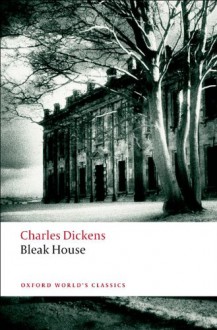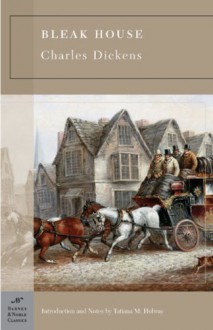
There are many curses that people place upon themselves and their descendants, some are the rest of their actions and others by their indecisions complicated by bureaucratic failures then sometimes it’s both. Charles Dickens shows the effects of both in his 1853 novel Bleak House not only on his main characters but also on secondary characters who are just unlucky to interaction with the afflicted persons.
Sir Leicester Dedlock and his wife Honoria live on his estate at Chesney Wold. Unknown to Sir Leicester, before she married, Lady Dedlock had a lover, Captain Hawdon, and had a daughter by him. Lady Dedlock believes her daughter is dead. The daughter, Esther Summerson, is in fact alive and is raised by Miss Barbary, Lady Dedlock's sister, who does not acknowledge their relationship. After Miss Barbary dies, John Jarndyce becomes Esther's guardian and assigns the Chancery lawyer "Conversation" Kenge to take charge of her future. After attending school for six years, Esther moves in with him at Bleak House. Jarndyce simultaneously assumes custody of two other wards, Richard Carstone and Ada Clare (who are both his and one another's distant cousins). They are beneficiaries in one of the wills at issue in Jarndyce and Jarndyce; their guardian is a beneficiary under another will, and the two wills conflict. Richard and Ada soon fall in love, but though Mr. Jarndyce does not oppose the match, he stipulates that Richard must first choose a profession. Richard first tries a career in medicine, and Esther meets Allan Woodcourt, a physician, at the house of Richard's tutor. When Richard mentions the prospect of gaining from the resolution of Jarndyce and Jarndyce, John Jarndyce beseeches him never to put faith in what he calls ‘the family curse’. Richard disregards this advice and his subsequent career endeavors fails as a result of his growing obsession while his personal relationship with Jarndyce deteriorates. Lady Dedlock is also a beneficiary under one of the wills and while looking at an affidavit by the family solicitor, Mr. Tulkinghorn, she recognizes the handwriting on the copy and almost faints, which Tulkinghorn notices and investigates. He traces the copyist, a pauper known only as "Nemo", in London. Nemo has recently died, and the only person to identify him is a street-sweeper, a poor homeless boy named Jo, who lives in a particularly grim and poverty-stricken part of the city known as Tom-All-Alone's. Lady Dedlock investigates while disguised as her maid, Mademoiselle Hortense. Lady Dedlock pays Jo to take her to Nemo's grave. Meanwhile, Tulkinghorn is concerned Lady Dedlock's secret could threaten the interests of Sir Leicester and watches her constantly, even enlisting her maid to spy on her. He also enlists Inspector Bucket to run Jo out of town, to eliminate any loose ends that might connect Nemo to the Dedlocks. Esther and Lady Dedlock see each other at church and talks at Chesney Wold without recognizing their connection. Later, Lady Dedlock does discover that Esther is her child. However, Esther has become sick (possibly with smallpox, since it severely disfigures her) after nursing the homeless boy Jo. Lady Dedlock waits until Esther has recovered before telling her the truth. Though Esther and Lady Dedlock are happy to be reunited, Lady Dedlock tells Esther they must never acknowledge their connection again. Meanwhile Richard and Ada have secretly married, and Ada is pregnant. Esther has her own romance when Woodcourt returns to England, having survived a shipwreck, and continues to seek her company despite her disfigurement. Unfortunately, Esther has already agreed to marry her guardian, John Jarndyce, who sees Woodcourt is a better match for her and sets not only Woodcourt with good professional prospects and sets the two of them up for an engagement. Hortense and Tulkinghorn discover the truth about Lady Dedlock's past. After a confrontation with Tulkinghorn, Lady Dedlock flees her home, leaving a note apologizing for her conduct. Tulkinghorn dismisses Hortense, who is no longer of any use to him. Feeling abandoned and betrayed, Hortense kills Tulkinghorn and seeks to frame Lady Dedlock for his murder. Sir Leicester, discovering his lawyer's death and his wife's flight, suffers a catastrophic stroke, but he manages to communicate that he forgives his wife and wants her to return. Inspector Bucket, who has previously investigated several matters related to Jarndyce and Jarndyce, accepts Sir Leicester's commission to find first Tulkinghorn’s murderer and then Lady Dedlock. He quickly arrests Hortense but fails to find Lady Dedlock before she dies of exposure at the cemetery of her former lover, Captain Hawdon. A new will is found for Jarndyce and Jarndyce that benefits Richard and Ada, but the costs of litigation have entirely consumed the estate bring the case to an end. Richard collapses and Woodcourt diagnoses him as being in the last stages of tuberculosis and he dies before the birth of his namesake son. John Jarndyce takes in Ada and her child, a boy whom she names Richard. Esther and Woodcourt marry and live in a Yorkshire house which Jarndyce gives to them. The couple later raise two daughters.
The above synopsis only covers the main plot, but expertly woven throughout are two subplots surrounding Caddy Jellyby and Mr. George Rouncewell who interact with the main characters at various times throughout the novel. Dickens masterfully crafts the cast of characters and the plot in an engaging and intriguing serious of plots that make the book a complete whole thus showing why his work is considered among the greatest of literature. Yet Dickens is also a bit too wordy resulting in scenes taking longer than they should and making some readers like myself, to start skimming through places in the later half of the book when a character that likes to spout off begins having a soliloquy of some indeterminable length at the expense of missing something connected to the slowly culminating climax.
Bleak House turns out to show Charles Dickens at his best as well as showing off what might be his one little flaw. The interesting characters and multilayered narrative keep the reader engaged throughout the book even as they must sometimes endure Dickens wordiness that might drown them in unnecessary prose. Though over 900 pages, a reader should not feel intimidated given that many Dickens books are an extraordinary length and the reader keeps on being engaged throughout their reading experience so that length does not matter.

 Log in with Facebook
Log in with Facebook 







